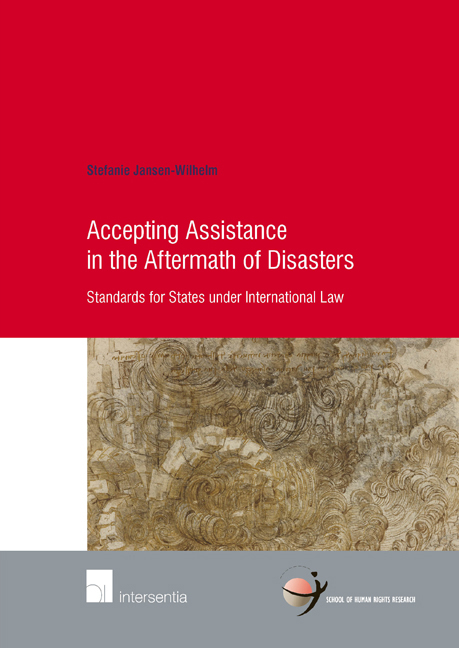Book contents
- Frontmatter
- Dedication
- Acknowledgements
- Contents
- List of Abbreviations
- Part I
- Part II
- Chapter IV The Content and Meaning of Article 2(1) ICESCR
- Chapter V Applying the ICESCR on Disaster Situations: Specific Obligations
- Chapter VI Final Conclusions
- Summary
- Bibliography
- Index
- Curriculum Vitae
- School of Human Rights Research Series
Chapter VI - Final Conclusions
from Part II
Published online by Cambridge University Press: 12 December 2017
- Frontmatter
- Dedication
- Acknowledgements
- Contents
- List of Abbreviations
- Part I
- Part II
- Chapter IV The Content and Meaning of Article 2(1) ICESCR
- Chapter V Applying the ICESCR on Disaster Situations: Specific Obligations
- Chapter VI Final Conclusions
- Summary
- Bibliography
- Index
- Curriculum Vitae
- School of Human Rights Research Series
Summary
INTRODUCTION
Disasters have devastating effects on the lives of people. The occurrence of a disaster can kill thousands in an instance, injure many others, damage homes and destroy livelihoods. Reconstruction takes a long time and the traumas last even longer. Natural disasters will not cease to exist and their impact appears to be ever growing. It is therefore of great importance that the response to a disaster is as effective and adequate as possible. If the disaster is too large for the affected state to cope with, other states, international organisations and NGOs are usually willing to assist. Although there is no guarantee that the situation of disaster survivors will greatly improve by external assistance, such help could be the difference between suffering due to a lack of supplies and being able to obtain at least the most basic resources. Nonetheless, some states affected by a disaster refuse international humanitarian assistance. They do this for a variety of reasons, a decision which can aggravate the effects of the disaster. Public international law offers hardly any instruments explicitly directing states’ behaviour regarding humanitarian assistance in response to a disaster. This research has therefore aimed to answer the following question:
To what extent does public international law contain standards for affected states determining whether they must accept international humanitarian assistance after the occurrence of a disaster?
As a first part of the research, a number of (legal) instruments and documents has been selected which potentially can be used to find clues for answering the main research question. Together with an analysis of the past attempts to organize the response to disasters on the international level, the consideration of fields of international law, resolutions, guidelines and other instruments has resulted in an overview of legal rules and principles depicting where the law on accepting humanitarian assistance in response to a disaster currently stands. Based on this a framework is designed departing from the primary role of the affected state and giving three steps for initiating and accepting international humanitarian assistance, together with three limitations of the affected state's freedom to withhold consent. Next to that, these findings have been placed in the light of and have been confronted with practice to determine what nuances, details and difficulties exist in the application of the rules ‘in real life’.
- Type
- Chapter
- Information
- Accepting Assistance in the Aftermath of DisastersStandards for States under International Law, pp. 197 - 210Publisher: IntersentiaPrint publication year: 2015

